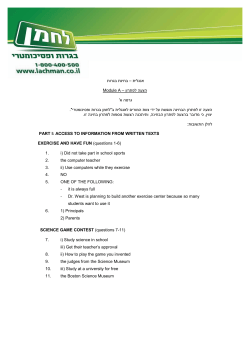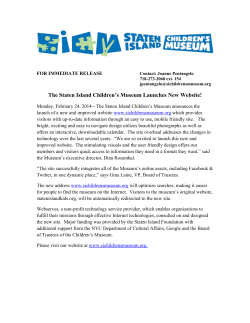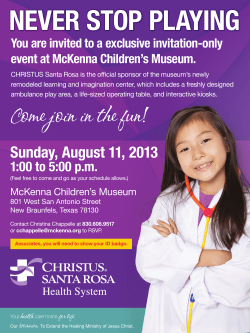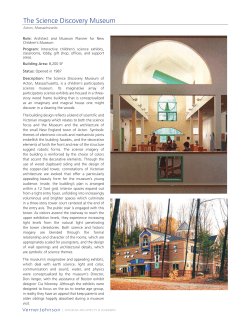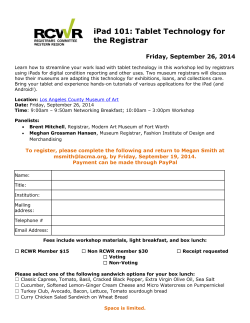
STANDARD QUERY REPORTS I - Association of Children`s Museums
STANDARD QUERY REPORTS I: Museum Data II: Facility Information III: Attendance & Membership 3. Building & Land Overview – land 12. Total served – number of onsite 1. Community Data & Museum ownership and leasing and offsite visits; child visitors as Milestones – museum information; LEED certification a percentage of total onsite location, population of the status visitors surrounding area, incorporation information 4. Transportation to Museum – 13. Gate admissions –admissions of and year opened to the public parking and public members, non-members, school 2. Ages Served & Admission – the core ages the museum serves, hours of operation and admission prices transportation 5. Building Square Footage – measurements of the entire museum and exhibit spaces; number of museum satellites 6. Childcare Facilities – enrollment capacity of childcare facility 7. Eating Facilities on site – size and type of eating facility 8. Library, Theatre and Performance Space – size and capacity of theater space; public library branch 9. Gift Shop – size of gift shop and management information 10. Outdoor Exhibits and Gardens – size of outdoor exhibits/ gardens 11. Building Expansion & Completion – anticipated size of expanded building . groups, etc.; this is a subset of Total Onsite admissions 14. Audience Diversity – diversity measurements; percentage of patrons that are diverse 15. Web site and Social Media – Web site visitor frequency and use of social media 16. Memberships and benefits – types of membership offered IV. Staff & Board of Directors V: Exhibits & Programs VI: Museum Finances 17. Staff and Board Members – number of full/part-time staff and board members 19. Early Childhood Programs & Exhibits – availability of early childhood programs and exhibits at the museum 26. Fiscal Year – dates of the museum’s fiscal year 18. Staff and Board Diversity – percentage of staff/board that consider themselves diverse, and how staff/board diversity reflects diversity of the local community 20. Child and Youth Programs – availability of programs for children and youth at the museum 21. Adult Programs – availability of adult programs at the museum 22. Outreach and Collaborative Programs – museum participation in head start and library collaborative programs; availability of outreach programs, including those targeting underserved audiences 23. School Programs, Charter Schools & Teacher Support – availability of programs that take place in schools/classroom or support teacher development; involvement with charter school(s) 24. Research and Evaluation – availability of formal research 25. Traveling Exhibits – availability of traveling exhibits Reports 32 to 42 on next page 27. Capital Campaign – purpose and amount of the campaign goal 28. Grants– grants awarded during the last fiscal year, including IMLS and NSF grants 29. Economic Impact – museum collects data about its economic impact in its community 30. Private Operating Support Donors & Board Annual Contribution – number of private donors in last fiscal year; percentage of Board that made an annual contribution 31. Reserve Fund and Endowment – value of reserve funds at the close of the last fiscal year VII: Operating Income VIII: Operating Expenses VIIII: Notes from the Director 32. Earned Income, which includes the following raw data: a. Revenue from Gate Admissions b. Revenue from Memberships c. Revenue from Educational Programs d. Other Revenue i. Exhibit Rentals, Birthday Parties, Catering, Gift Shop ii. Preschool Childcare iii. Other Fees and Earned Income 36. Operating Expenses, which includes the following raw data: a. Personnel Costs b. Exhibit Rental c. Gift Shop d. Development e. Marketing/ Advertising f. Educational Programs g. Membership Program h. Administrative Costs i. Facility Maintenance j. Ancillary Expenditures k. Rent/Mortgage 40. Overview of Last Fiscal Year – comments about accomplishments, needs, and operations 33. Endowment Income 34. Contributed Income, which includes the following raw data: a. Total Contributed Income (Private) b. Total Contributed Income (Public) 35. Operating Income, which includes the following raw data: a. Total Earned Income b. Interest and Endowment Income c. Total Contributed Income 37. Depreciation 38. Capital Expenditures, which includes the following raw data: a. Capital Expended on Exhibits b. Capital Expended on Building Renovations and Expansions 41. Relationship with State & Federal Governments –visits from federal/local government; government partnerships, maintenance of government relationship, amount of any appropriations 42. Emerging Trends – comments about emerging trends in the children’s museum field 39. In-Kind Reporting Instructions: 1. Select one of these 42 Query Reports about museum operations. If you need data that is not included in one of these Query Reports, please contact the ACM offices at 703-224-3100. 2. Choose how ACM will identify the peer museums included in the Query Report. ACM suggests that you identify a range of values for one of the following categories. a) Total Museum Square Footage f) Total Operating Expenses b) Exhibit Space Square Footage g) Total Museum Attendance c) Museum location (urban, suburban or rural) h) Early Childhood Programming d) Total Operating Income (budget) i) MSA Population e) Total Contributed Income j) Other 3. Complete the online Query Request Form, or email acm@ChildrensMuseums.org.
© Copyright 2025
